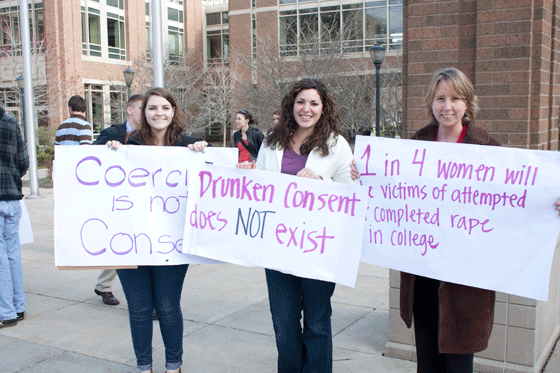
In a perfect world, this editorial wouldn’t need to be written. There wouldn’t have to be survivors, we wouldn’t need to discuss the detrimental effects of sexual assault, and more than anything, the argument that these persisting issues are real and valid would not have to be made. But, until we live in that world, we will shout this even if our voices shake: sexual assault survivors must be heard.
The Journal of American College Health says that students are at the highest risk for sexual assault on campus during their first year from the start of school until Thanksgiving break.
This period in a college student’s life is vulnerable for many reasons – for some, it is their first time living away from home. And although college comes with a lot of freedom and promise, there is also a lot of fear. The pressure to fit in with your peers, excel in school and get involved on campus is immense. This whirlwind period of time makes first-year college students especially vulnerable in life and to sexual assault.
The first step in helping combat sexual assaults on campus is to raise awareness of resources in place for students to remain safe.
It is important to note that if a student is sexually assaulted on campus, it does not mean that they were being “reckless.” It does not mean that they did not take preventative measures or are at fault for what happened to them. Subscribing to that kind of victim-blaming mentality is harmful and ignorant.
With that said, it is important for students to make a plan when they are going out to socialize.
Going with friends who they trust, being aware of their surroundings and walking in groups are all important in order for students to remain safe and comfortable.
But, we know that even if someone does everything “right,” it is still always possible that they will be assaulted.
Over 13% of college and graduate students report being sexually assaulted. We must remember that this number only includes reported incidents of sexual assault. Sexual assault, misconduct and harassment all occur in numbers beyond just what is reported.
Rape is the most under-reported crime, and the majority of sexual assaults are not reported to the police. And with this, survivors are left to deal with the aftermath of their assault.
Many college students do not report their assaults out of fear. Fear of retaliation from the perpetrator, fear that they would not be taken seriously by authorities and fear that they do not have proof so they will not be believed. We all must make a more conscious effort to recognize and validate survivors – whether or not they choose to report their assault.
In the event that survivors do wish to report their assault, it is important for them to know how to take the next steps.
Students can find several viable outlets on campus. They could speak with their university’s psychological services, police department or health centers. Marquette University has a sector called “Advocacy Services” where students can go to report their incidences and seek support.
Another avenue that students can take is to seek a civil protection order. This is also referred to as a “temporary restraining order” that students can file to protect themselves from their attacker if they remain on campus.
However, not all of the weight that comes with bearing the aftermath of sexual assault should lie with the survivor. Significant responsibility is left to that survivor’s community and the general public.
Sexual assault is not something that should be controversial.
If you know somebody who has been assaulted, do not ask them what they were wearing. Do not ask them if they were drinking or if they were out after dark.
It is important to note that survivors can be assaulted by somebody of the same gender. They can, and are more likely to, be assaulted by somebody they know – maybe even somebody that they love. They can be assaulted when they are intoxicated, sober, in the day, in the night – sexual assaults do not discriminate. And we must validate everyone’s survival.
If somebody is brave enough to share their survival story with you, believe them and validate them. Care for them. Advocate for them. Support them. Do not doubt, do not judge and do not dismiss.
The issue of sexual assault may be more prevalent now for college students, but it is a sad reality year-round for many. Do not let your vision be blurred or your stance waver: Denounce sexual assault and support the survivors around you.
This story was written by Grace Cady. She can be reached at [email protected].








